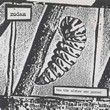|
|

From head to heart Following our retroscope series of latter years, here we go again! Here's Speakers' corner's cousin; From head to heart. Luna Kafé's focused eye on great events, fantastic happenings, absolute milestones, or other curious incidents from the historic shelves'n'vaults of pop'n'rock. Blowing our ears and our head, punching our chest and shaking our heart. Making us go sentimental, but not slaphappy. This moonth the Lunar shuttle revisits a 20-year-old in the labyrinth, or the hazy maze of post-hardcore, post-rock, math-rock, and modernist-rock. As it was: The modern dance. Once again.
Rodan RODAN: Rusty (Quarterstick, 1994). Recorded by Bob Weston 1993. Players: Jason B. Noble: guitars and vocals, Tara Jane O'Neill: Bass and vocals, Jeff Mueller: guitars and vocals: Kevin Coultas: drums. Track listing. 1. Bible Silver Corner; 2. Shiner; 3. The Everyday World of Bodies; 4. Jungle Jim; 5. Gauge; 6. Tooth Fairy Retribution Manifesto.
I, for one, bought Rusty on the basis of its supposed similarities to Spiderland, which at that point was my favorite record. And, boy!, was I disappointed! OK, it started quite well, with this feline-like starter of a song. The song was instrumental, though,which I did not really care for back then, but at least it had a melody. The rest of the album I could not make heads or tails of, though: no sung lyrics, either shouting or whispering, no melodies, lots of feedback and discordant notes, and NO TWO BARS WERE PLAYED THE SAME; it was variation all the way. I simply could not comprehend this record. However, in those days, living on limited funds, one always gave an album bought with the small means one had several spins (in my case, I lived on my student's loan - which I'm still paying down, by the way, so in a sense I'm still paying for the album), and a couple of months after having purchased it, I listened to it on the bus one early morning (I copied all my new records to cassettes so I could listen to them on my Walkman). At first I was as bewildered as I had been on the previous four or five listens, when all of a sudden the music just made sense. This happened while listening to the opening of 'Gauge', the album's fifth song. This song starts with a typical chaotic instrumental arrangement, before smoothing out, and then Jeff and Tara takes turn in whispering the lyrics. The first line both, but Tara barely audible, the second line she was on her own, and so they continued, while the guitar played four simple, yet - I unexpectedly thought to myself - beautifully put together notes. Something had happened; out of the blue I understood the record, I understood the music, I understood the dynamics, the discordance, the whispering and the shouting. I had broken through the shell of the album. Not just this song, it turned out, but all the songs. In that moment, in those few lines of duet-whispering, my relationship with Rusty changed completely; it went from an impenetrable mess to the most beautiful record on earth. And it still is.
Rodan broke up just a few months after Rusty was released, and played their last concert in the autumn of 1994. As mentioned; it is hard enough to carry the weight of your own band if you don't have to carry Slint on top of it. But maybe the break-up also occurred because Rodan realized that there was no way to top Rusty. It might also be because the band wanted to move on; following Rodan, a plethora of other bands and projects that rarely sounds anything like Rodan appeared: the equally-impulsive-sounding but much less noisy Sonora Pine; the math-rocky June of 44; the faux-classical Rachel's; the closest-to-Rodan-sounding Shipping News, Jason's experimentally Per Mission, Tara Jane's solo-career, and more. Never touching the heights of Rusty, these projects have nonetheless released records that are well worth visiting also for those who cannot break through the hard shell of Rusty (and if you haven't: try again!)
Ending on a sad note: almost two years ago, on August 4 2012, Jason B. Noble succumbed to cancer. Having been musically active until the end, one of the last things he contributed to was preparing an album of Rodan songs that had been recorded and released before Rusty. Included was also a three-song Peel-session with all new songs recorded after Rusty. The album, 15 Quiet Years, is a good one, but it confirms that there was something remarkable going on when recording Rusty, something that transcended the sheer quality of the songs. Maybe the cue lies in the album's title; Rusty is named after the colour of the hair of Bob Weston, who engineered the record. Probably the band sensed the importance of Weston's input in making a bunch of separate songs into the organic, yet frenzied totality that is the masterpiece Rusty. Copyright © 2014 Asle H. Kiran
|
| © 2014 Luna Kafé |
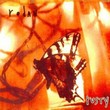
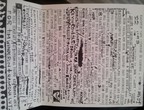 Rusty, this ugly, beautiful, insane, wondrous, frenzy, and ultimately impeccable record turns 20 years these days (April 4). This album is as stunning as the butterfly grazing the cover, and as chaotic as the printing of the lyrics and credits on the accompanying poster/booklet (see picture). Rusty invites us in with the graceful and refined opening track, 'Bible Silver Corner', and then it smashes our heads in with 'Shiner', the shouting pandemonium that follows. After that, the album offers equal doses soothing balsamic moods and harsh terrorizing noise. Both extremes break the listener down in tears, begging for it to continue. Seldom has an album demanded such attention through the sheer impact of its music; the contrasting dynamics ensures that you can never visit the record for a casual listening experience. And why should you; after all, it is the greatest record ever made.
Rusty, this ugly, beautiful, insane, wondrous, frenzy, and ultimately impeccable record turns 20 years these days (April 4). This album is as stunning as the butterfly grazing the cover, and as chaotic as the printing of the lyrics and credits on the accompanying poster/booklet (see picture). Rusty invites us in with the graceful and refined opening track, 'Bible Silver Corner', and then it smashes our heads in with 'Shiner', the shouting pandemonium that follows. After that, the album offers equal doses soothing balsamic moods and harsh terrorizing noise. Both extremes break the listener down in tears, begging for it to continue. Seldom has an album demanded such attention through the sheer impact of its music; the contrasting dynamics ensures that you can never visit the record for a casual listening experience. And why should you; after all, it is the greatest record ever made.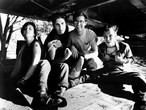 In 1991, a fairly unknown band from Louisville, Kentucky released a record called Spiderland, and subsequently broke up. Within a couple of years, the repute of Slint had grown to such heights that when Rodan was about to release their debut album in 1994, they were seen as "heirs of Slint", and by reviewers Rusty was talked of as "Spiderland-y". This connection was a burden no band should have to be concerned with; it is hard enough to break through on you own account, if you're not going to be compared to another, idiosyncratic and revered band; it just wasn't musically fair. To me, Rusty has exactly one resemblance to Spiderland; it goes from the very quiet to the very noisy within the space of one song. In Rodan's case, this happens several times in each song. However, being the "new Slint" probably did help Rodan to a few more listeners. Although quite established around Louisville, and with a former 'single of the week' from Sonics Lee and Thurston when they guest edited the reviews in NME (or was it Melody Maker, I cannot remember), to the general indie-public they were as unknown as Slint was when Spiderland was released.
In 1991, a fairly unknown band from Louisville, Kentucky released a record called Spiderland, and subsequently broke up. Within a couple of years, the repute of Slint had grown to such heights that when Rodan was about to release their debut album in 1994, they were seen as "heirs of Slint", and by reviewers Rusty was talked of as "Spiderland-y". This connection was a burden no band should have to be concerned with; it is hard enough to break through on you own account, if you're not going to be compared to another, idiosyncratic and revered band; it just wasn't musically fair. To me, Rusty has exactly one resemblance to Spiderland; it goes from the very quiet to the very noisy within the space of one song. In Rodan's case, this happens several times in each song. However, being the "new Slint" probably did help Rodan to a few more listeners. Although quite established around Louisville, and with a former 'single of the week' from Sonics Lee and Thurston when they guest edited the reviews in NME (or was it Melody Maker, I cannot remember), to the general indie-public they were as unknown as Slint was when Spiderland was released.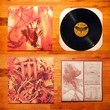
 There are many moments of sheer beauty on Rusty: the feedback on the second verse of 'Jungle Jim'; how the guitars and bass play together a minute and a half into 'Tooth Fairy Retribution Manifesto'; the whole of 'Bible Silver Corner' of course; all these moments still bring tears to my eyes. But in fact, once you have cracked the secrets of this album, it is all beautiful: the shouting, the guitars' feedback-driven jarring lines, the tight, but wandering bass, the jumbled drumming, etc. At first it sounds like the musicians are playing different songs, but in fact it comes together brilliantly and forms a remarkable unity. Often Rusty is lauded as a math-rock masterpiece. In my mind, though, this is not math-rock. I find math-rock to be calculated, rehearsed and predictable (and I am a math-rock fan), whereas Rusty is organic, unpredictable; it seems impulsive, as if it was improvised in the studio, although it is far from it. The two main
things in common with math-rock are long songs, and sudden changes from quiet to noisy. If I have to describe Rusty in terms of a genre, it would be as covering that narrow area between post-hardcore and screamo. It is a tiny area with room for only one band (well, maybe one more; Norway's shamefully overlooked Sigh & Explode, whose These Seem Like Tarantulas from 2009 has some of the same visionary chaotic splendor to it as Rusty has).
There are many moments of sheer beauty on Rusty: the feedback on the second verse of 'Jungle Jim'; how the guitars and bass play together a minute and a half into 'Tooth Fairy Retribution Manifesto'; the whole of 'Bible Silver Corner' of course; all these moments still bring tears to my eyes. But in fact, once you have cracked the secrets of this album, it is all beautiful: the shouting, the guitars' feedback-driven jarring lines, the tight, but wandering bass, the jumbled drumming, etc. At first it sounds like the musicians are playing different songs, but in fact it comes together brilliantly and forms a remarkable unity. Often Rusty is lauded as a math-rock masterpiece. In my mind, though, this is not math-rock. I find math-rock to be calculated, rehearsed and predictable (and I am a math-rock fan), whereas Rusty is organic, unpredictable; it seems impulsive, as if it was improvised in the studio, although it is far from it. The two main
things in common with math-rock are long songs, and sudden changes from quiet to noisy. If I have to describe Rusty in terms of a genre, it would be as covering that narrow area between post-hardcore and screamo. It is a tiny area with room for only one band (well, maybe one more; Norway's shamefully overlooked Sigh & Explode, whose These Seem Like Tarantulas from 2009 has some of the same visionary chaotic splendor to it as Rusty has).